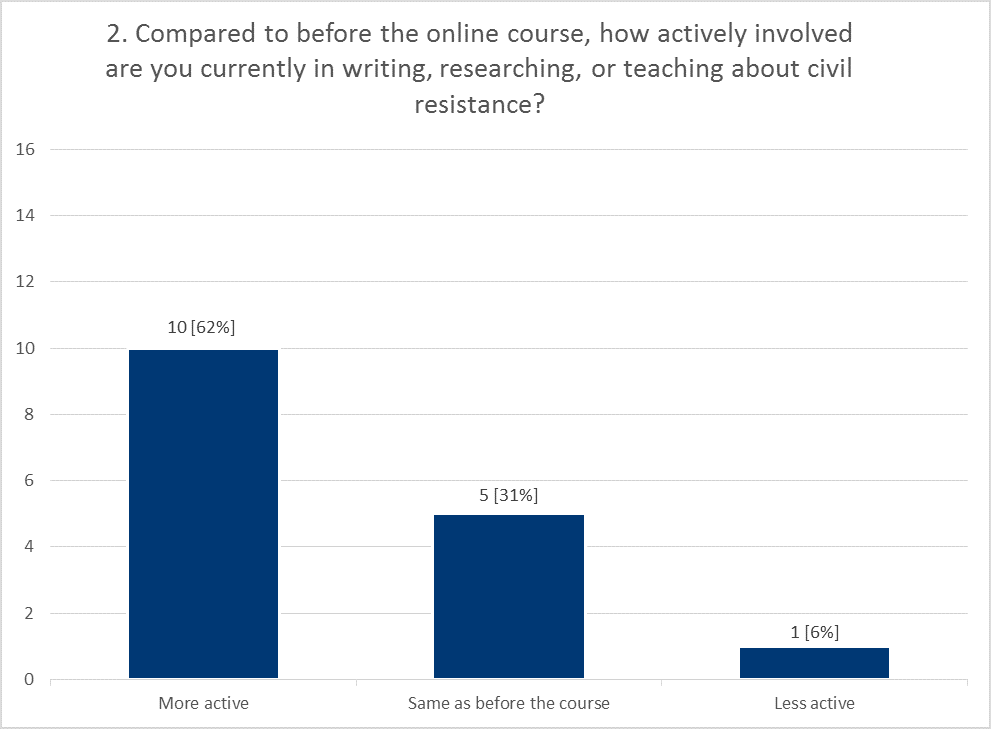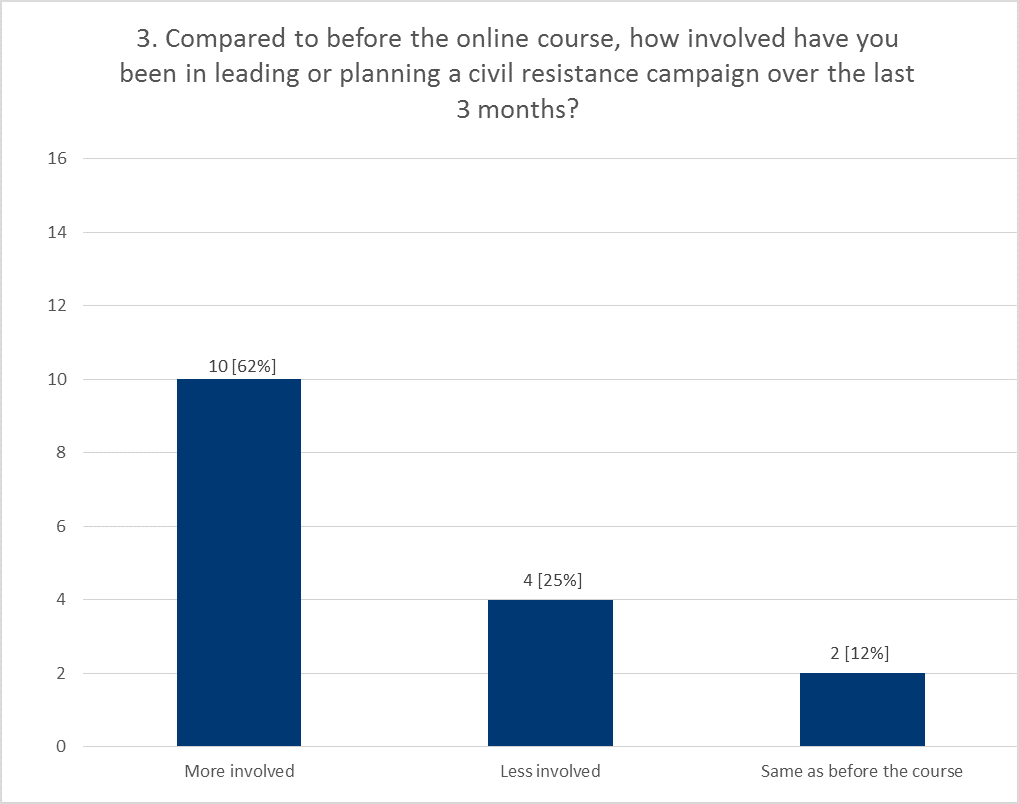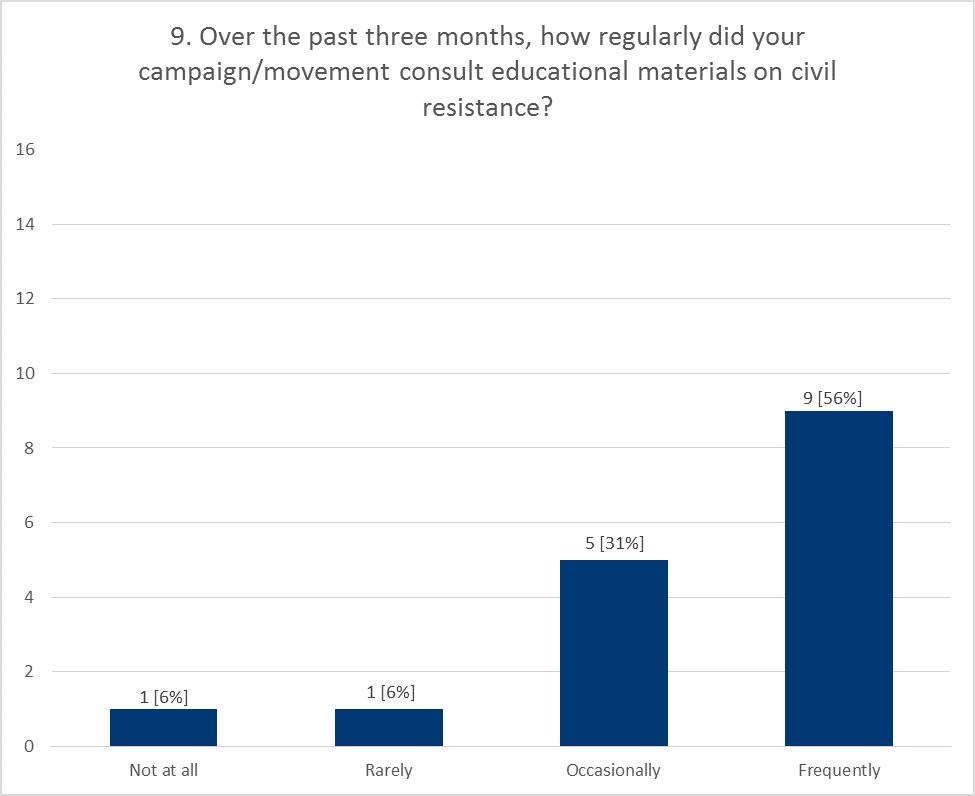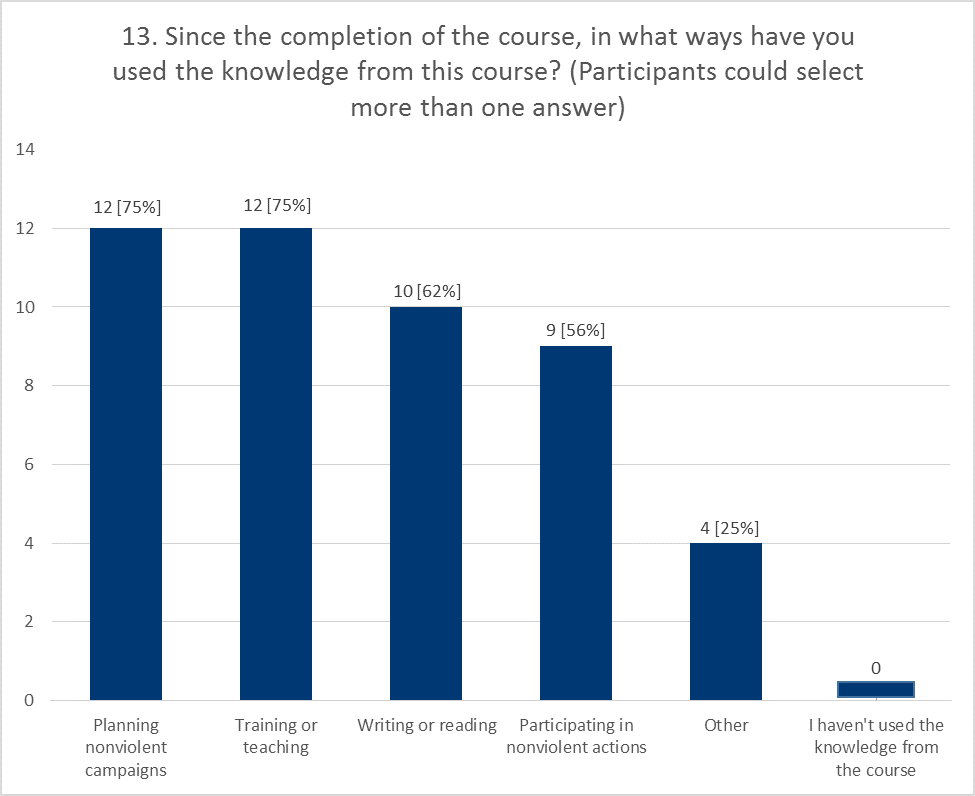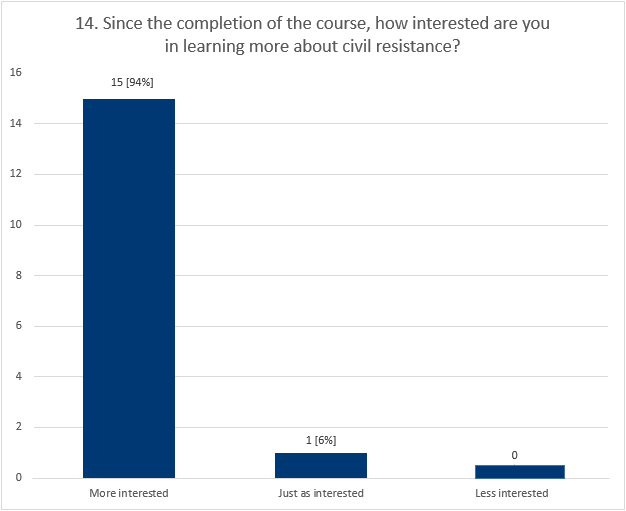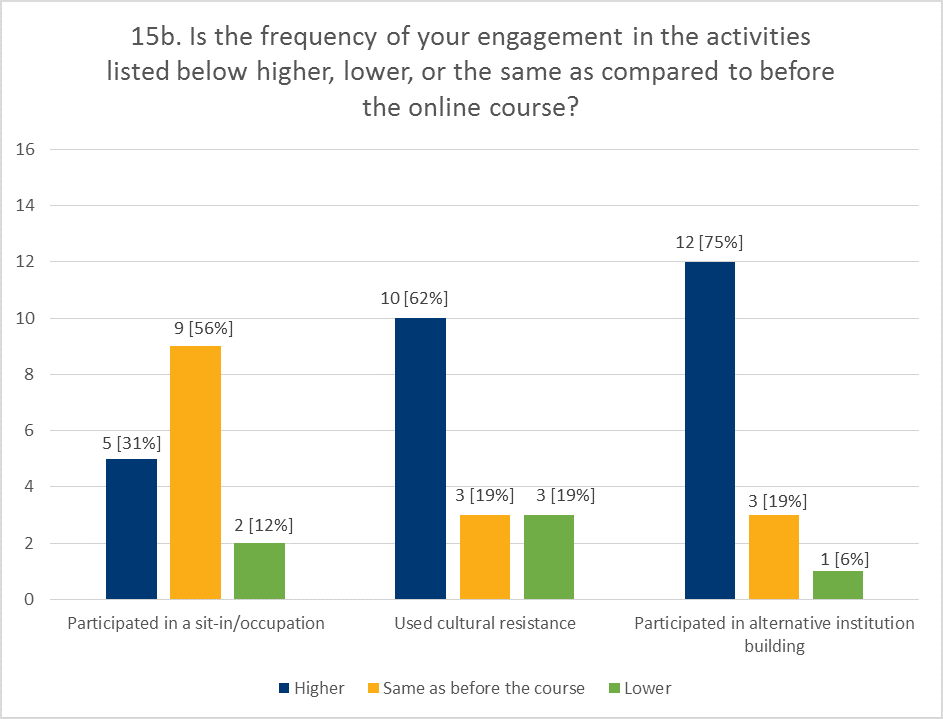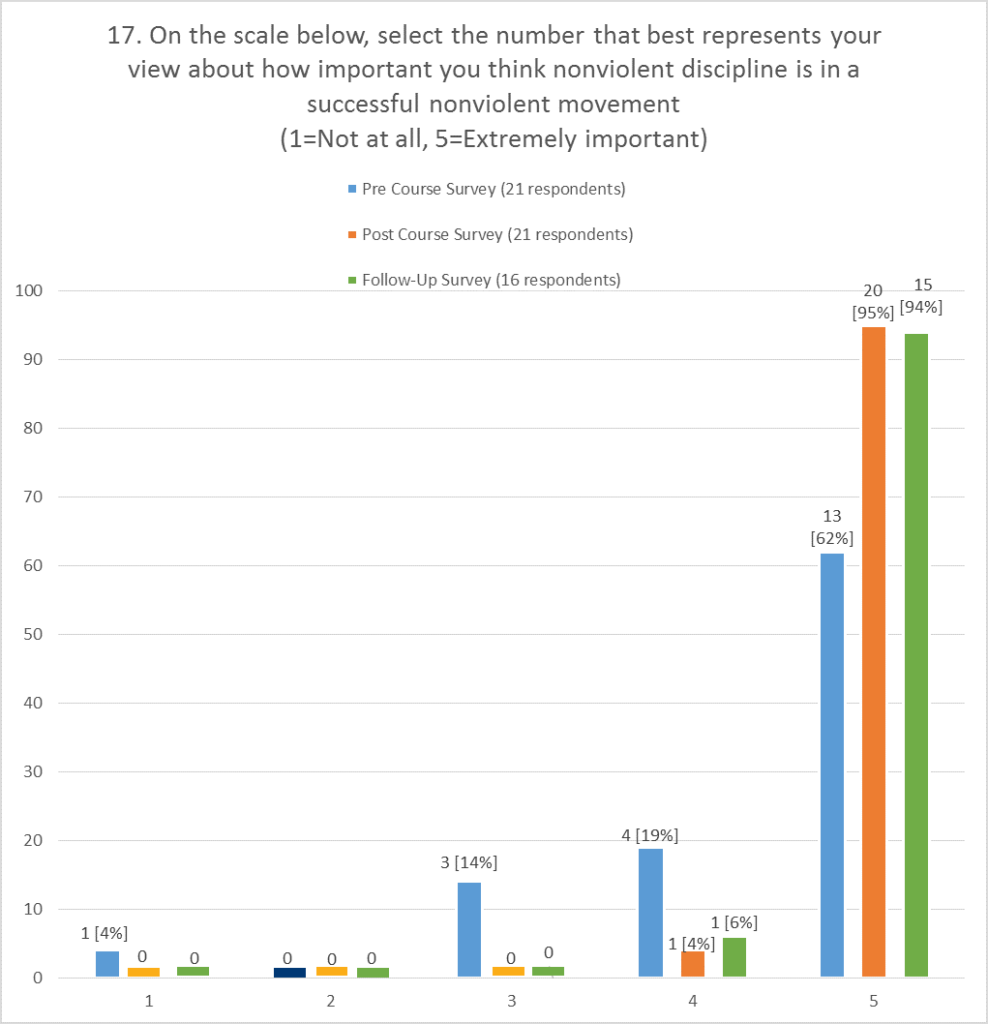2018 ICNC-Rutgers Online Course Assessment
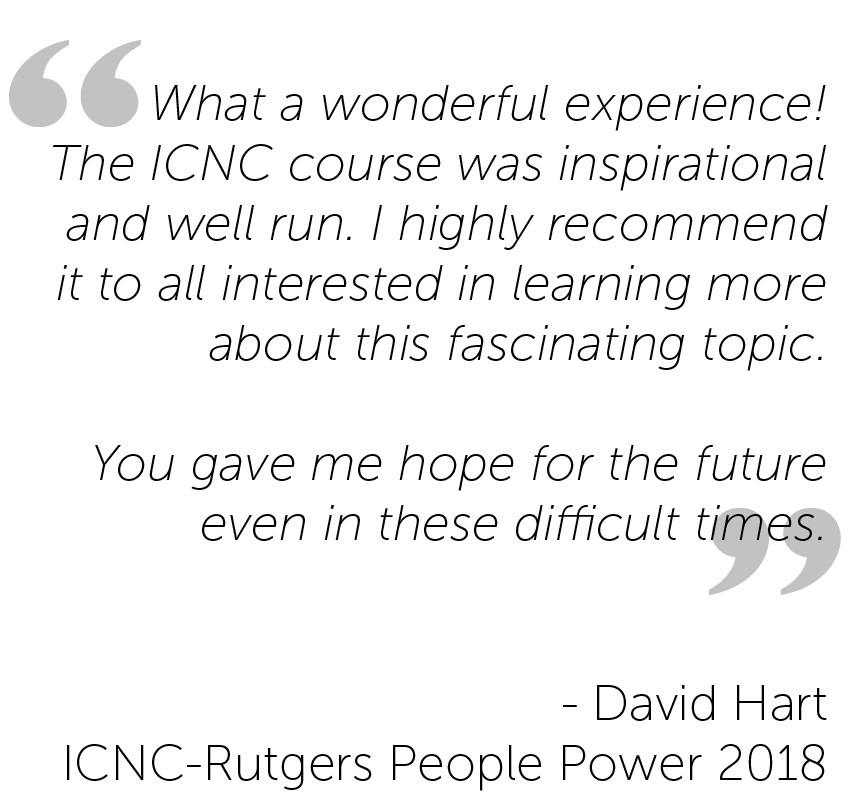
ICNC offered a moderated online course: “People Power – The Study of Strategic Nonviolent Resistance” in partnership with the International Institute for Peace at Rutgers University Graduate School, which took place from September 2nd, 2018 to November 1st, 2018. This was the sixth year that ICNC has run this course.
Read more about the 2018 course and assessments below.
You can also view assessments from previous courses in 2017, 2016, 2015, 2014, 2013, 2012.
Applications, Admission and Course Participants
In 2018, ICNC received 115 applications for the People Power online course. The quality of applications was high and it took several rounds of reviews to select the 64 participants who were invited to take part in the online course.
The 64 accepted applicants came from a wide range of backgrounds and countries, as shown in the graphs below. The largest number of participants came from North America with sixteen, followed by Europe and Asia with fifteen participants each.
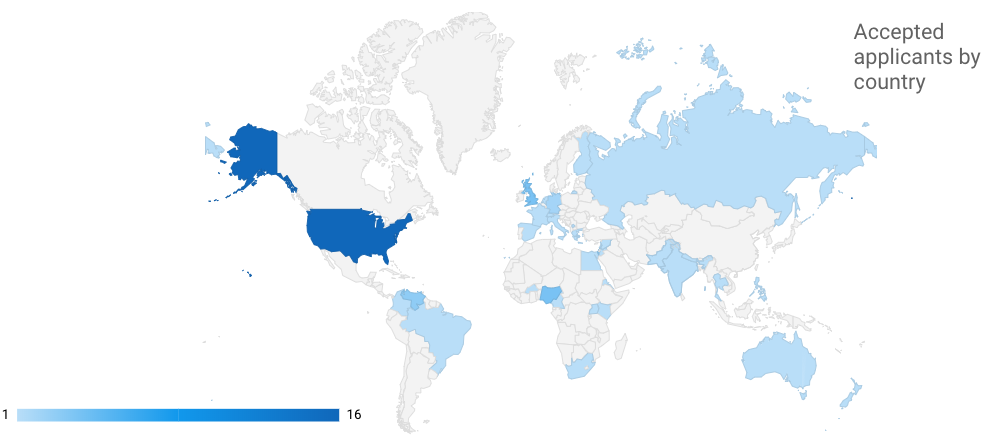
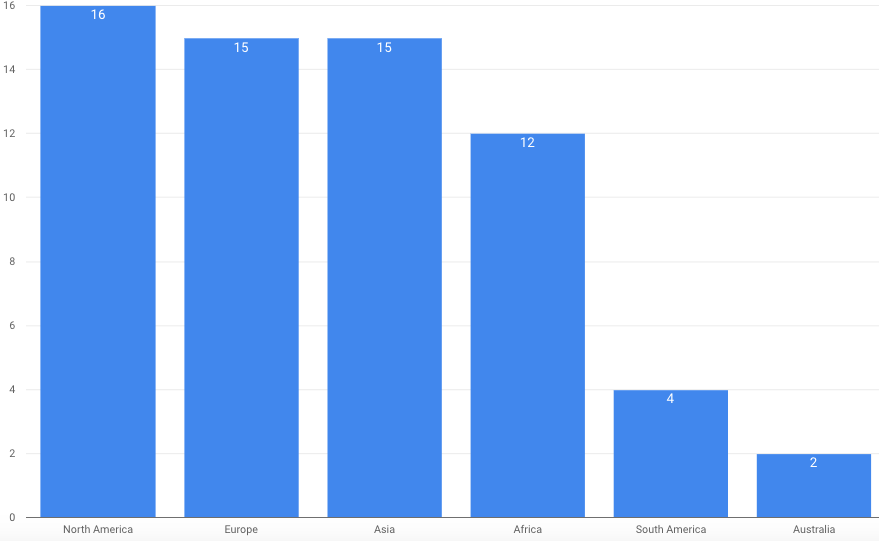
The accepted participants also came from a diverse range of professional backgrounds. The majority of participants had a background in activist/movement building, followed closely by a background in non-profits, and then by education/academia. Participants could choose more than one answer when selecting their background.
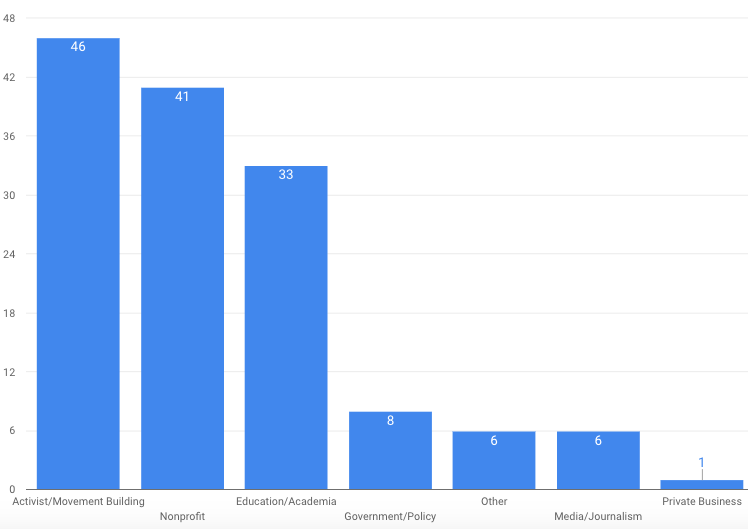
Before the course began, ICNC hosted two orientation webinars for course participants. Each orientation webinar contained survey questions asking participants what they hoped to gain from the course. In summary, participants indicated that they wanted to gain practical knowledge on how to organize civil resistance campaigns more effectively, as well as learning about general dynamics, concepts and cases of civil resistance. The participants also wanted to share their own on-the-ground experience with other learners.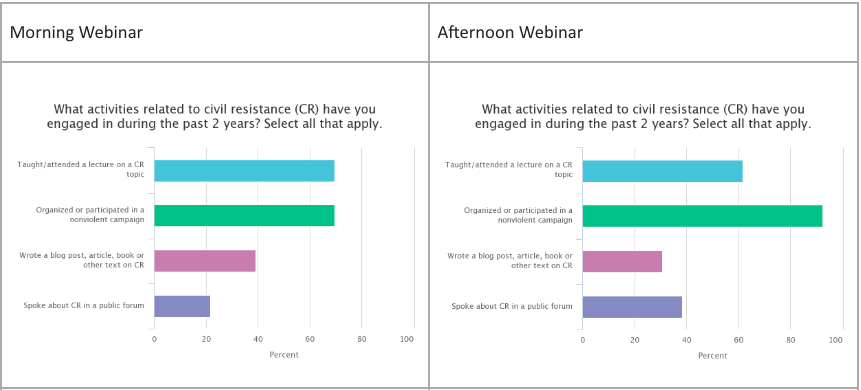
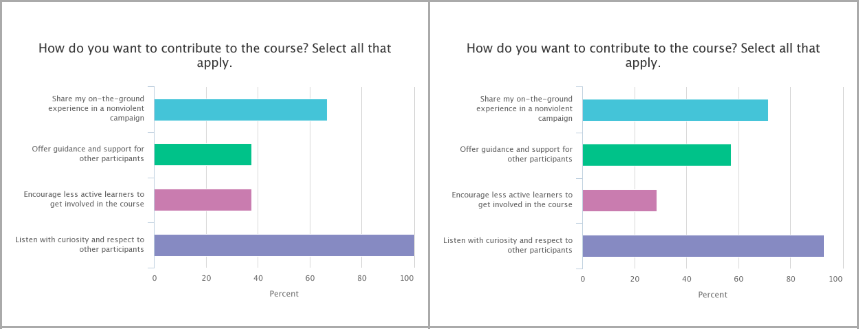
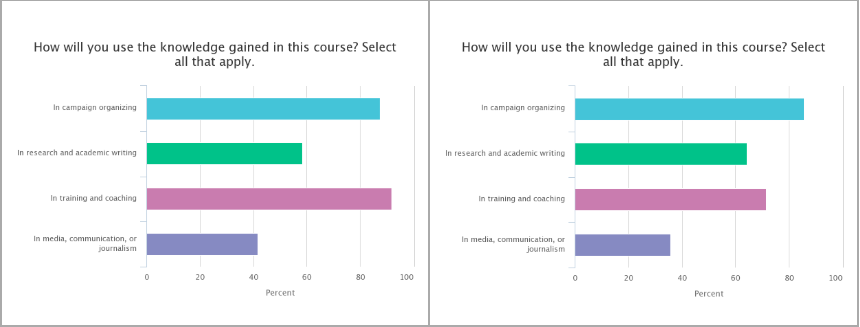
Course Content
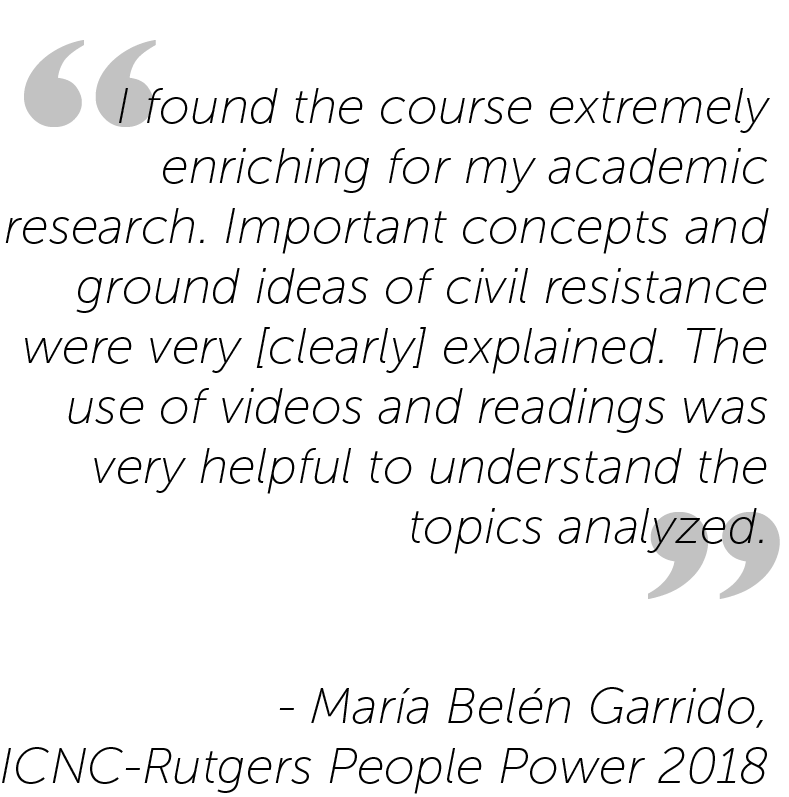 For the third year, ICNC had Academic Advisers who moderated the various discussion forums, adding an important value to the overall educational experience and a recognition to the course standing. The course moderators included: Dr. Kurt Schock, Dr. Mary King, Dr. Veronique Dudouet, Dr. Kathleen Gallagher Cunningham, Isak Svensson, Dr. Cecile Mouly, Dr. Janjira Sombatpoonsiri, Dr. Maciej Bartkowski, Dr. Steve Chase, Azaz Elshami, Julia Constantine, Gina Addo, and Daniel Dixon
For the third year, ICNC had Academic Advisers who moderated the various discussion forums, adding an important value to the overall educational experience and a recognition to the course standing. The course moderators included: Dr. Kurt Schock, Dr. Mary King, Dr. Veronique Dudouet, Dr. Kathleen Gallagher Cunningham, Isak Svensson, Dr. Cecile Mouly, Dr. Janjira Sombatpoonsiri, Dr. Maciej Bartkowski, Dr. Steve Chase, Azaz Elshami, Julia Constantine, Gina Addo, and Daniel Dixon
For the second year, the online course featured interactive group work that participants engaged in. Participants completed this work during Modules 4 and 7. Their work consisted of answering discussion questions, holding video conferences, and developing a summary/statement regarding the content in each respective module.
Course instructors provided summaries of the forum discussions in a particular module, highlighting key points made, debates taking place and core information that was shared.
Course participants also had access to the ICNC Mobile App, available on iOS and Android. By using the app, participants could download the course content and access it offline when they were travelling or if they were in areas with low internet access.
Module 1: Welcome and Introductions
In the welcome module, we laid out the objectives of the course. We discussed course activities, including forum posts, recorded webinars, readings, videos, webinar meetings and online discussions. We then introduced the participants and course organizers and moderators. We provided online learning tips to help participants make the most of the online learning experience. Finally, we introduced participants to the People Power Game: A Strategic Game About Civil Resistance, a video simulation that participants play throughout the course, during which the player takes on the role of a strategic planner for a nonviolent movement.
Module 2: Foundation of Civil Resistance
In this session we laid the theoretical groundwork out of which this field has grown, digging into both data and the big picture. Virtually every day, somewhere in the world, there are people engaging in civil resistance. But what do we mean by this term? Do we all understand it the same way? How is civil resistance defined and spoken about in participants’ towns, communities, regions or countries? In this session we clarified the concept of civil resistance, looking into power that underlies people’s actions and considering the track record of civil resistance over the past 110 years, including the reasons behind its effectiveness. This module aimed to equip participants with data to share with others in their networks about the effectiveness of civil resistance, and to enable them to articulate what civil resistance is in a clear and concise manner.
Module 3: Emergence of Civil Resistance, Conditions and Skills
In this session, we looked at the emergence of civil resistance, the role and impact of conditions, and the importance of skills. We discussed the commonly-held view that certain conditions need to be in place for civil resistance to succeed. We looked at how skills of a movement actually stack up against the conditions civil resistance faces in a particular struggle context and what makes nonviolent actions effective in an environment that inhibits civil resistance. This session explored how civil resistance emerges often despite unfavorable conditions, considered various social developments within groups that make them more likely to rise up, and reflected on the importance of conditions in analyzing emergence and trajectories of civil resistance struggles. This module aimed to help participants understand the interplay between skills and conditions, and how skills can help overcome adversarial conditions.
Module 4: Media Coverage and Civil Resistance
In this module, participants were organized into nine different small groups and tasked with several group assignments. They watched an ICNC video on the effectiveness of various media strategies and discussed their thoughts and questions with each other in discussion forums. After engaging in an online discussion, participants then held a video conference together. Their work during the module culminated in a group handout with 15 different principles that civil resistance movements can use when creating a media strategy.
Module 5: Strategies and Tactics of Civil Resistance
In this session, participants looked at what strategy in civil resistance is, and how it relates to tactics. We examined examples of different tactics, including cultural resistance tactics, and discuss tactical innovation, including strategic sequencing of tactics that enhance the effectiveness of nonviolent methods and campaigns. Finally, we explored different conflict analysis tools that help movements systematically assess and analyze the battlefield in which they are engaging nonviolently.
Module 6: Repression and Backfire, Defections, Violent Flank
In this session, we started with a discussion about repressive contexts in which nonviolent resistance movements take place, and the phenomenon of backfire when violence against unarmed activists boomerangs back to those who carried out the repression. We explored how civil resistance movements can optimize the impact of backfire and use it to their advantage. How does the side that uses repression aim to hinder potential backfire? We then discussed defections that often, though not always, occur as a result of the backfire effect. This module focused on understanding defections from one group — security forces — and explores conditions under which the defections might happen. It also explored how regimes often try to mitigate the likelihood of security defections, and strategies that movements might deploy to increase chances of loyalty shifts among security forces. The last topic that this module explored was that of violent flanks. We looked at how the presence of a violent group — either part of a larger nonviolent movement or existing separately from it (e.g. armed insurgency) — impacts the dynamics and effectiveness of nonviolent struggle overall.
Module 7: Anti-Corruption Campaigns and Civil Resistance
This module was the second group work module. Participants were given a hypothetical case study and their group assignment was to create an anti-corruption campaign strategy plan. After watching videos and reviewing readings, the groups held online discussions and video conferences to discuss their groups’ campaign plan. They finished the module by creating a campaign strategy plan and sharing their work with the other groups for their review.
Module 8: New Frontiers in Civil Resistance
This module explored a variety of topics in the study of civil resistance, including: women and nonviolent resistance, democratization and civil resistance, and civil resistance and corporate governance. These (and other) topics were considered new frontiers in the quickly evolving field of civil resistance studies. They are often seen as either under-researched or only now gaining significance in the analysis of nonviolent conflict.
Module 9. Final Course Evaluation & Learning Gains Survey
In the last two days of this online course we solicited participants’ views about the course and their learning experience. We asked about their learning progress, overall educational experience, assessment of the course content, interactions in the forums, and their personal engagement during the six-week period. This feedback has allowed us to improve our future online courses and make our teaching pedagogy on civil resistance more effective and more impactful on all learners involved.
Learning Gains Survey Results
Included below are the graphed responses to selected questions from the learning gains survey (conducted among the same group of participants that took both surveys) that demonstrate the extent of the knowledge gains from before and after the course.
The Pre-Seminar Learning Gains survey was completed by 37 participants and Post-Seminar Learning Gains survey by 29 participants. The comparative results from Pre and Post-Seminar surveys, included in the graphs below, are based on the responses of 24 participants that filled out both surveys. To see the full results of the Learning Gains surveys, please click here. You can use the links below to navigate directly to each graph.
14) On a scale of 1-5, select the number that best represents your view about how important you think nonviolent discipline is in a successful civil resistance movement.
16) Please list any and all civil resistance strategies and tactics that you know of.
21) How do you envision applying the knowledge that you gained from this course?
1) On a scale of 1-5, select the number that best represents your current knowledge of civil resistance or nonviolent movements.
19% of post-seminar respondents selected “5” for the above statement, compared to 0 pre-seminar respondents. 62% of post-seminar respondents selected “4”, compared to 19% of the pre-seminar respondents.
38% of the pre-seminar respondents selected “2”, compared to 0 post-seminar respondents.
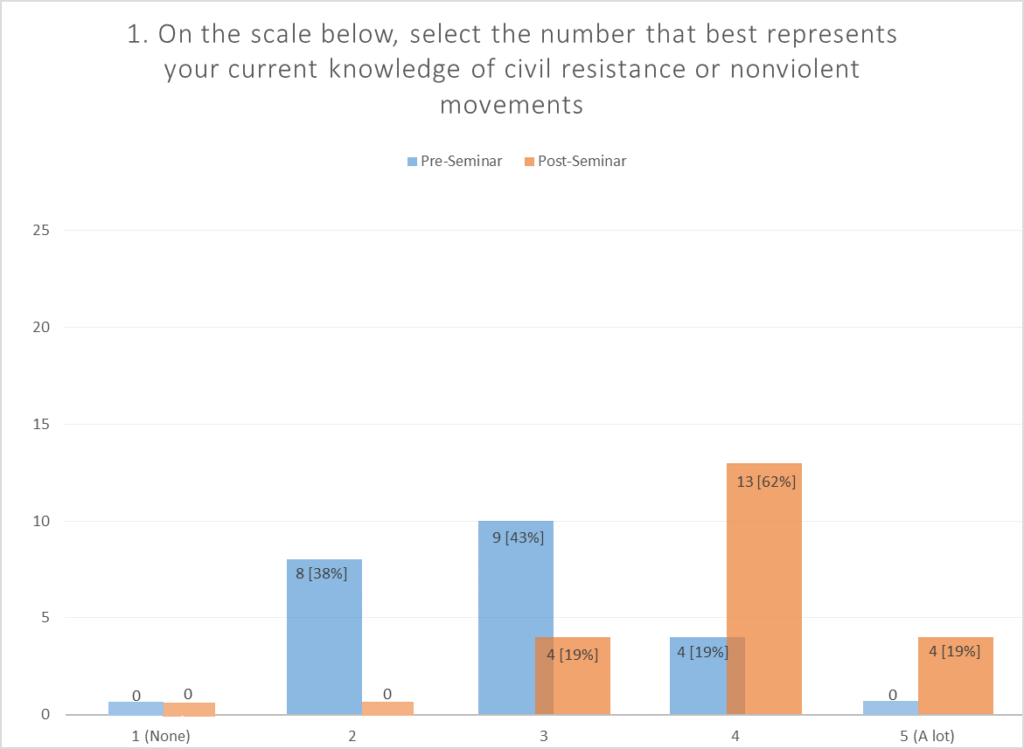
2.) On a scale of 1-5, identify your comfort level in speaking to others about civil resistance or nonviolent movements.
28% of post-seminar respondents selected “5” and 62% selected “4” compared to 24% of pre-seminar participants who selected “5” and 4% who selected “4”.
9% of post-seminar respondents selected “3” compared to 48% of pre-seminar respondents. None of the post-seminar respondents selected “1” or “2”.
This shows that a majority of respondents felt much more comfortable talking about civil resistance after the course than they did before.
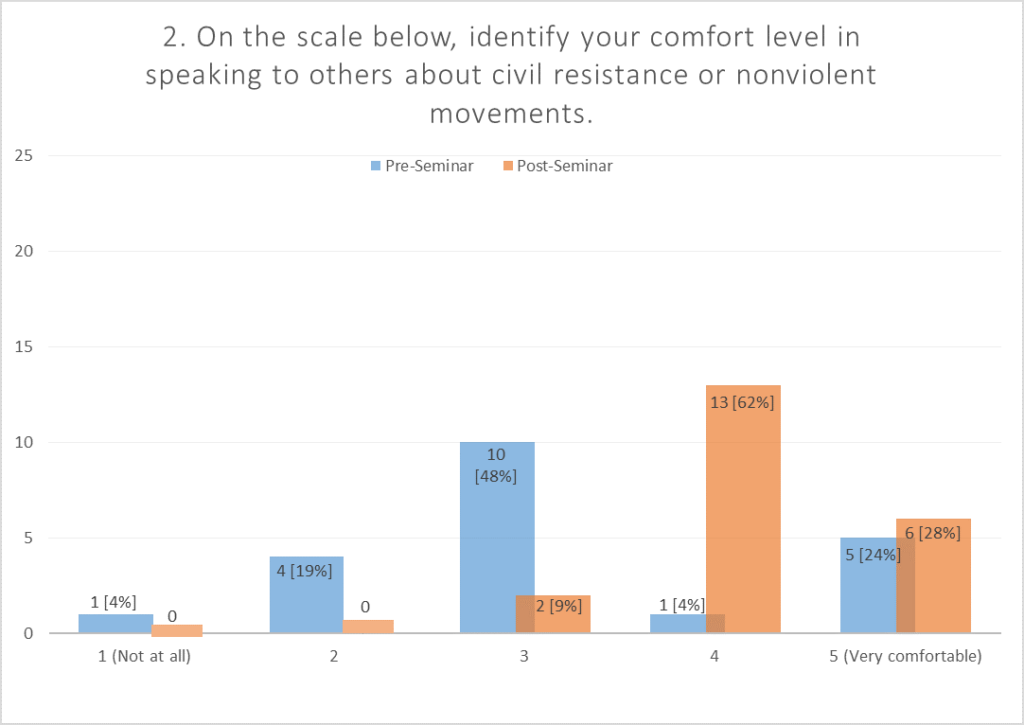
3) On a scale of 1-5, identify your comfort level in participating in civil resistance or in a nonviolent movement.
57% of post-seminar respondents selected “5” and 38% selected “4”, compared to 9% of pre-seminar respondents who selected “5” and 52% who selected “4”
None of the post-seminar respondents selected “1” or “2” and only 1 respondent selected “3”
This shows that a majority of participants felt more comfortable participating in civil resistance or nonviolent movements after the course than they did before.
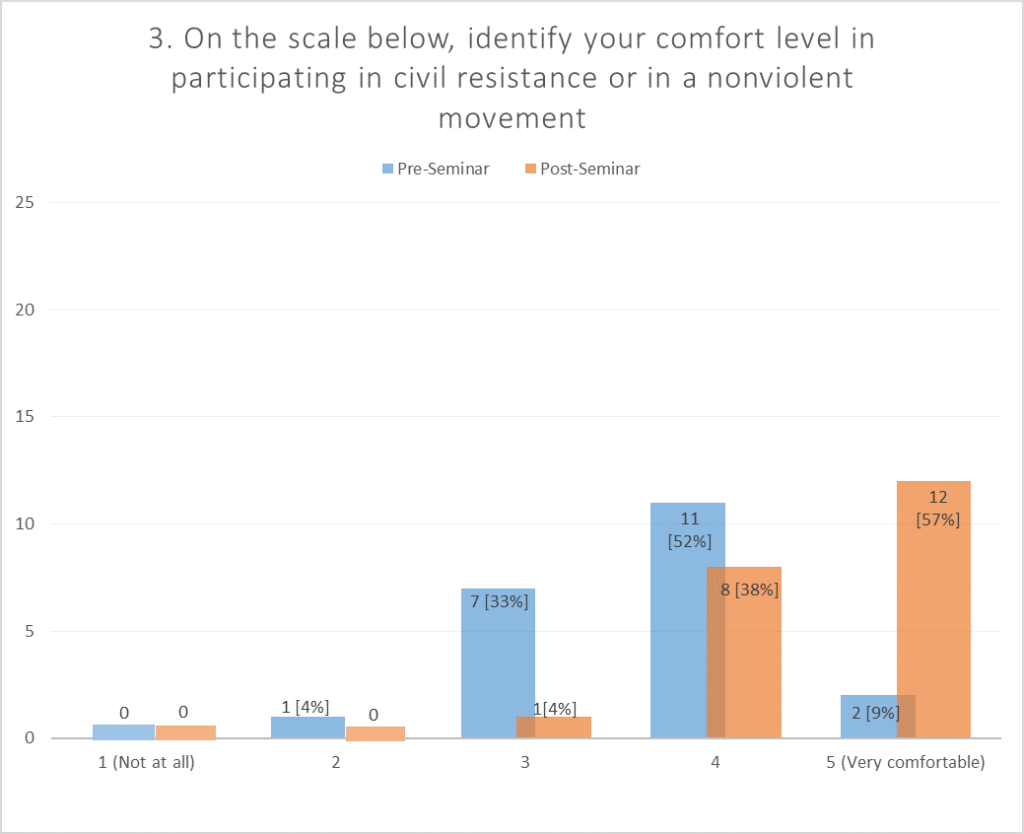
7) On a scale of 1-5, select the number that best represents your view that revolutions against brutal regimes can succeed ONLY if revolutionaries retain the option to use violent means.
86% of post-seminar respondents selected “5” and 14% selected “4” compared to 57% of pre-seminar respondents who selected “5” and 38% who selected “4”
0 post-seminar respondents selected “1”, “2”, “3”.
This shows that respondents strongly disagreed that revolutions against brutal regimes could succeed ONLY if they had the option of using violent means. Respondents believed that revolutions could succeed WITHOUT using violence.
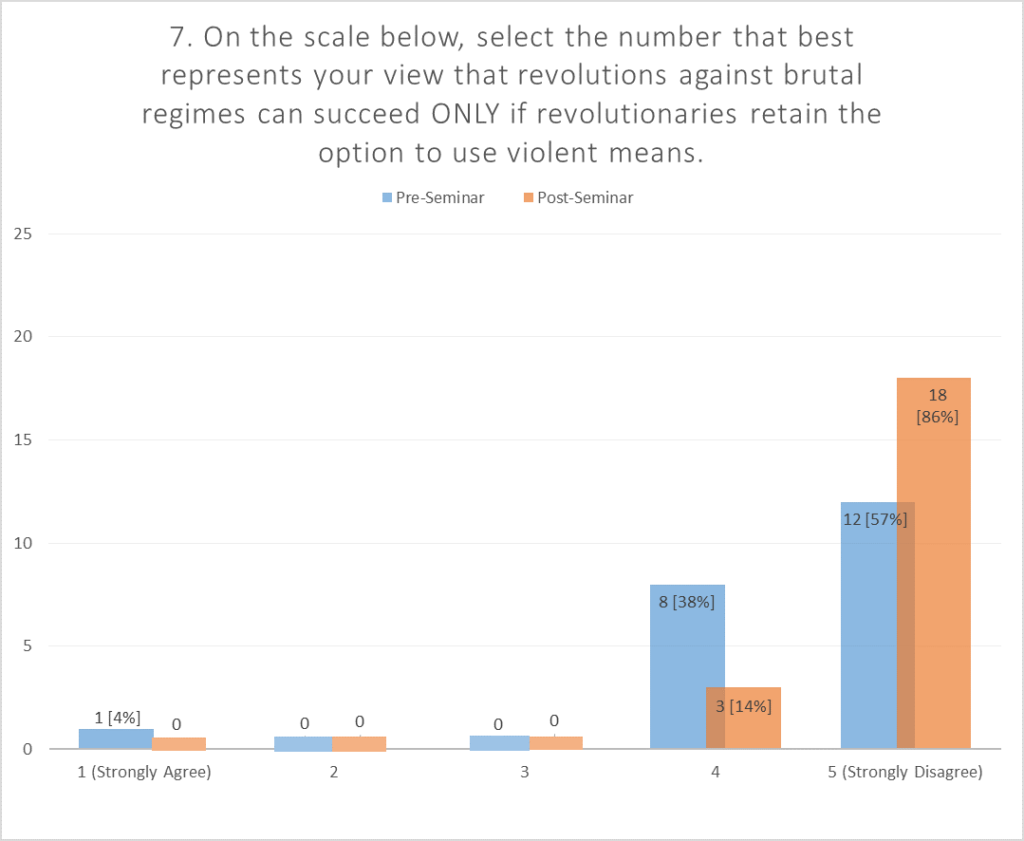
12) On a scale of 1-5, select the number that best represents your view about how important you think strategic planing is in a successful civil resistance movement
95% of post-seminar respondents selected “5”, compared to 62% of pre-seminar respondents.
None of the post-seminar respondents selected “1”, “2”, or”3″, and only 1 selected “4”
This shows that more respondents believed strongly that strategic planning was essential to successful civil resistance movement after the course than they did before.
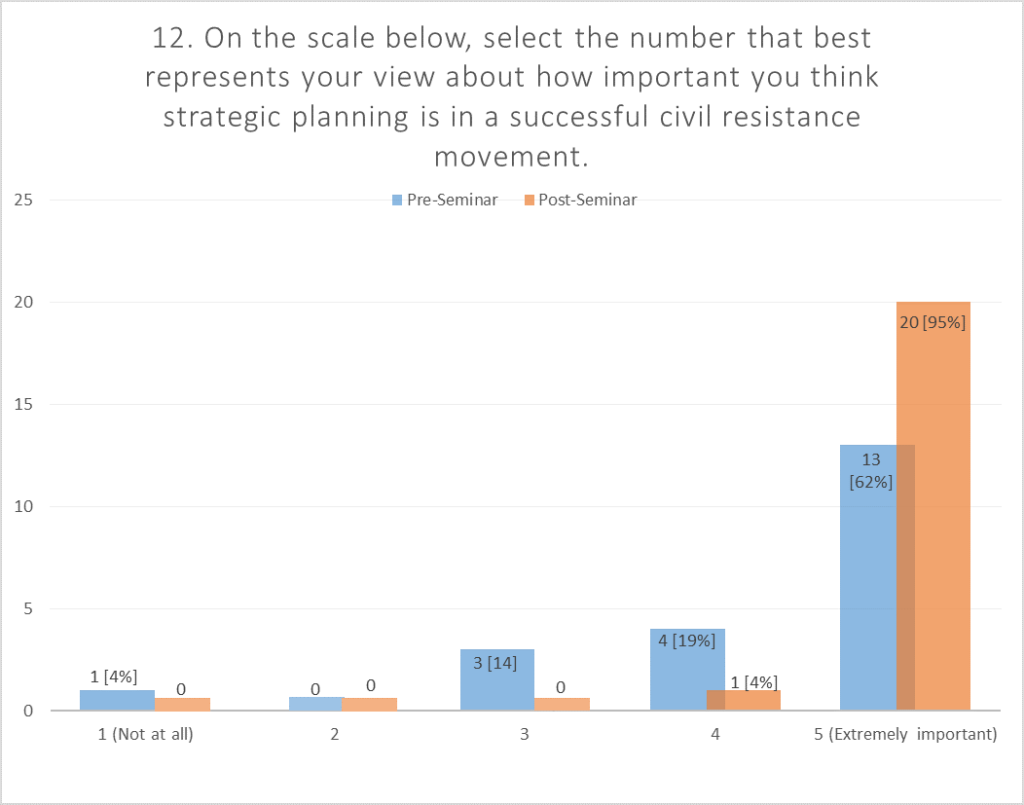
14) On a scale of 1-5, select the number that best represents your view about how important you think nonviolent discipline is in a successful civil resistance movement.
95% of post-seminar respondents selected “5”, compared to 62% of pre-seminar respondents.
None of the post-seminar respondents selected “1”, “2”, or “3” and only 1 selected “4”
After the course, almost all of the respondents believed that nonviolent discipline was extremely important in a successful civil resistance movement.
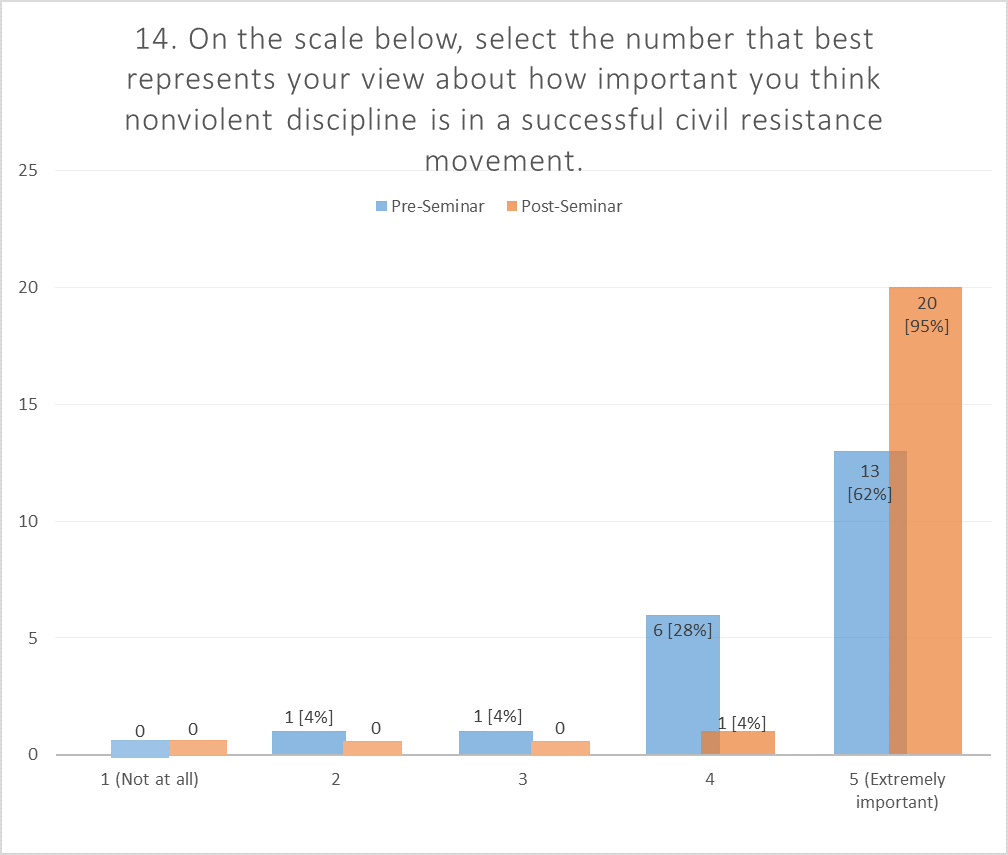
16) Please list any and all civil resistance strategies and tactics that you know of (participants answered qualitatively by listing civil resistance strategies/tactics)
Pre-Seminar: The most frequent words listed by participants were: Gene Sharp, protest, and march. This showed that participants came into the course familiar with Gene Sharp and his 198 methods of nonviolent action. Participants were mostly familiar with forms of civil resistance such as public protests and marches
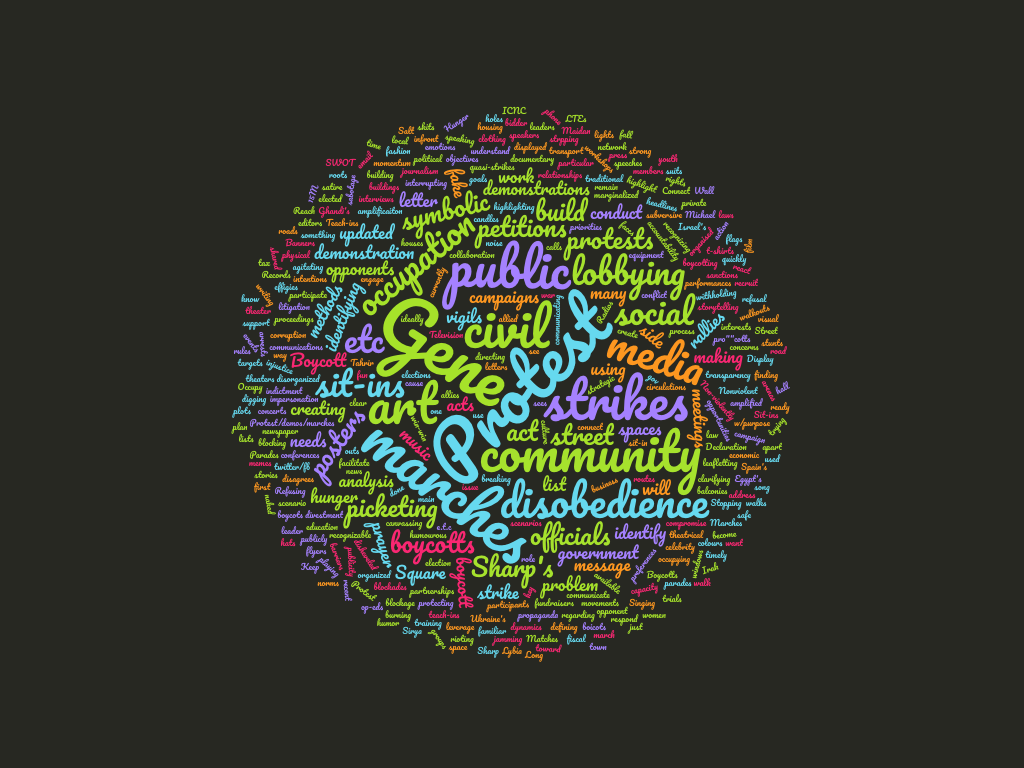
Post-seminar: The main words that participants chose in the post-seminar survey were: public, symbolic, protest, media, and boycott. This shows that participants began to appreciate a larger range of nonviolent actions available to activists that, next to protests and demonstrations, consist of noncooperation tactics, including boycotts. They also developed better understanding of the nuances involved with using cultural resistance and the powerful role of media in civil resistance.
The word “alternative” was not used at all in the pre-seminar survey, whereas it was used frequently in the post-seminar survey, showing that participants understood alternative institution building as a viable, and sometimes necessary, strategy for nonviolent movements.
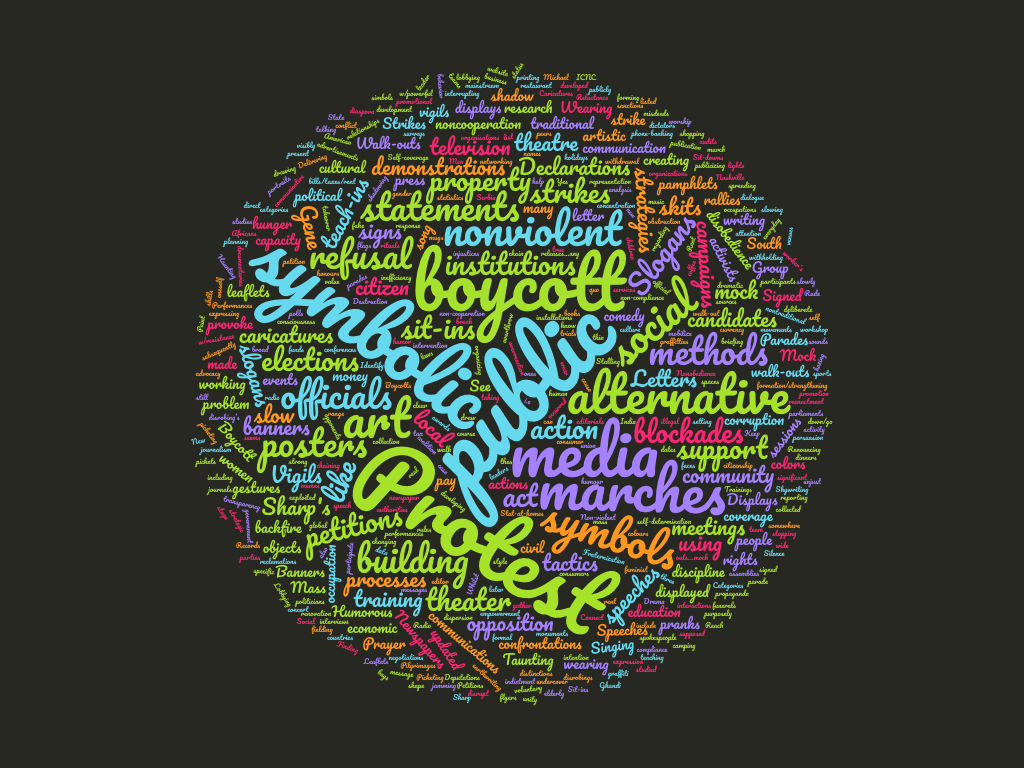
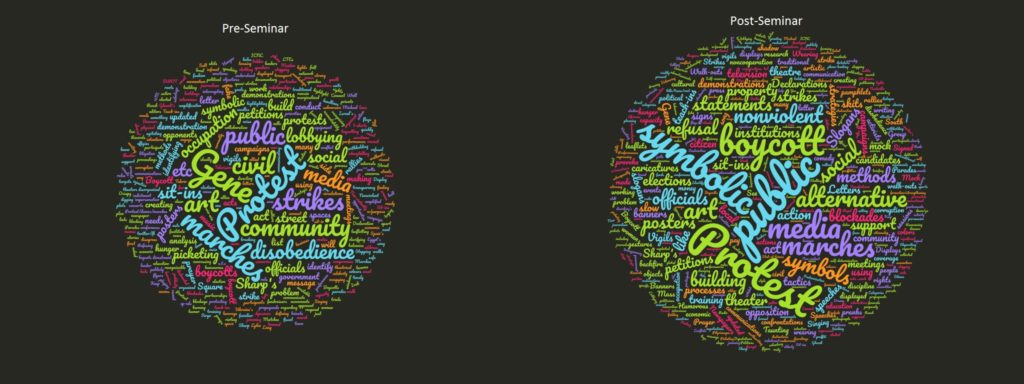
21) How do you envision applying the knowledge that you gained from this course? (Participants could choose multiple answers)
A large majority of respondents, 86%, in the pre and post seminar surveys saw themselves applying their knowledge through teaching, educating or training others.
86% of post-survey respondents also saw themselves applying their knowledge directly in nonviolent campaigns.
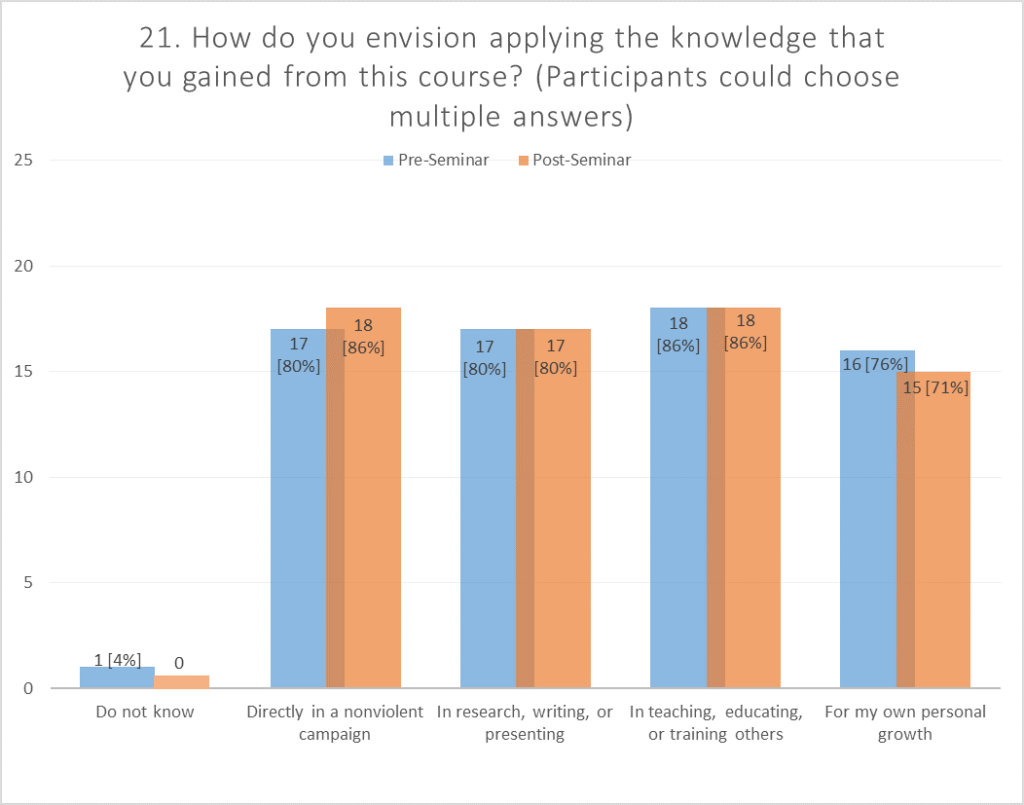
Final Evaluation Results
Included below are select graphed responses to questions from the Final Course Evaluation. To see all of the graphs from the final evaluation, please click here. 34 out of 64 participants completed the final course evaluation.
 Click on the links below to see the selected graphs for each section.
Click on the links below to see the selected graphs for each section.
I. Course Content
II. Group Work
III. General Impression of the Course
IV. Knowledge Gained
V. Course Moderation
VI. Peer Learning
VII. Applicability
I. Course Content
1) The goals of the course and it’s modules were clear
79% of respondents strongly agreed with the above statement and 7 respondents agreed, showing that all of the survey respondents felt that the goals of the course were clear.
None of the respondents indicated that they felt the goals were unclear.
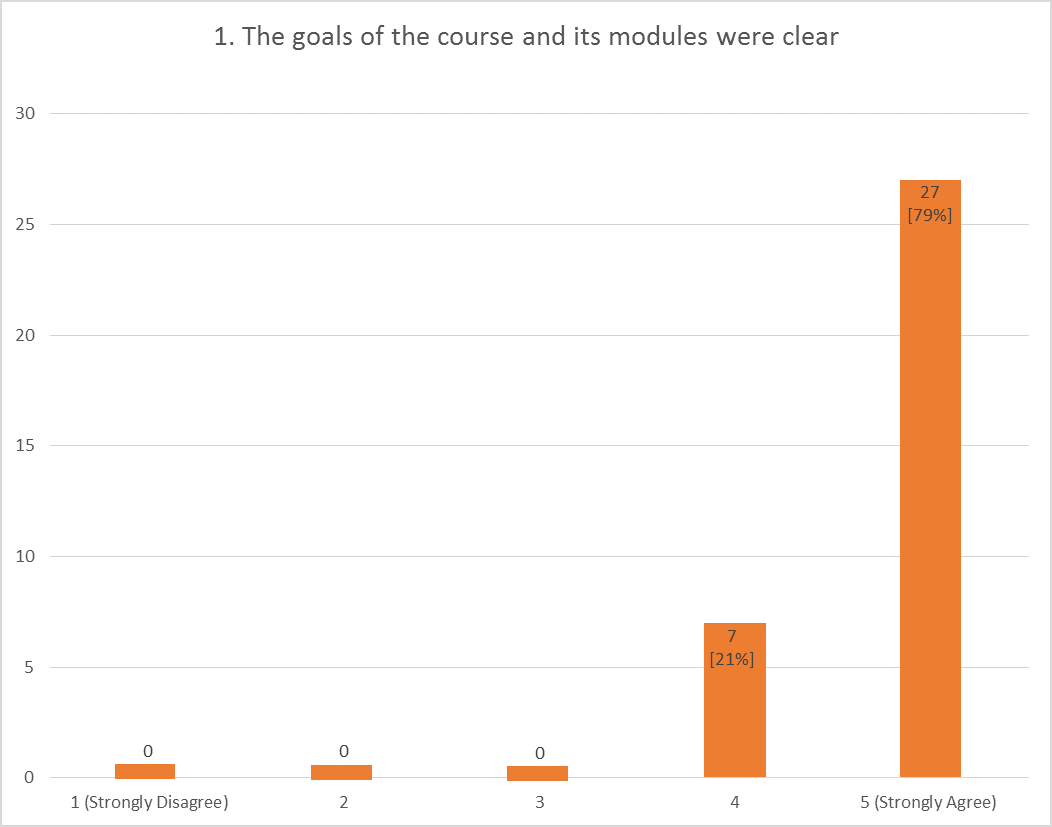
3) Taking this online course was a positive experience.
91% of respondents strongly agreed with the above statement and 9% agreed showing that all of respondents felt that being in the ICNC-Rutgers online course was a positive experience for them.
None of the respondents indicated that the course was a negative experience.
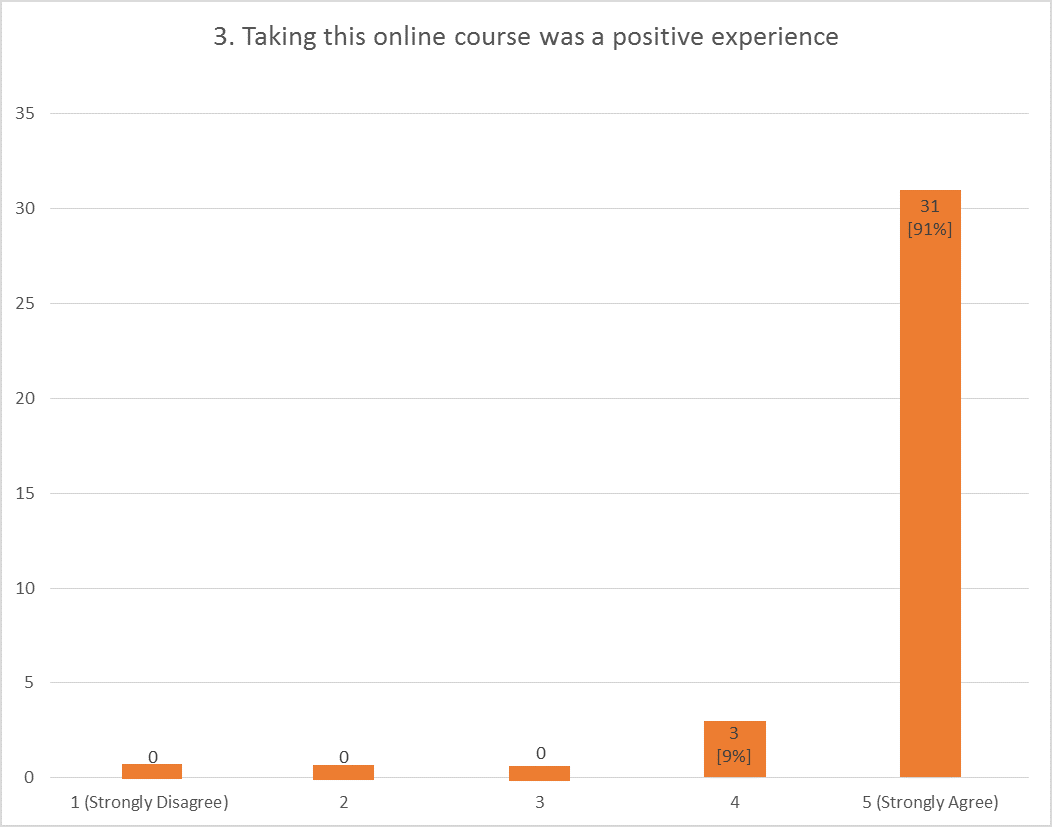
II. Group Work
 For the second year, the ICNC-Rutgers course featured interactive group work. Although participant feedback shows that there is still room for improvement, the responses were generally more positive than last year.
For the second year, the ICNC-Rutgers course featured interactive group work. Although participant feedback shows that there is still room for improvement, the responses were generally more positive than last year.
8) Small group exercises were organized and substantive
41% respondents strongly agreed with the above statement and 15% agreed, showing that the majority felt that the group exercises were organized and substantive.
26% selected “3”, showing that there is still room for the course small group exercises to be improved.
However as the second graph below shows, in the 2017 ICNC-Rutgers course only 22% strongly agreed with the above statement, showing that there was an almost 20% increase of respondents who strongly agreed with the above statement. This increase can be attributed to several changes that ICNC made in the 2018 course. Participants were given more time to introduce themselves to each other and were encouraged to create FB, slack, WhatsApp or other social media groups. The group work instructions were also clarified so that participants could distinguish between work that they were to do as individuals and work that was to be done with the whole group. Lastly, ICNC created volunteer roles within each group, in order to ensure that there was an appropriate division of labor within the group members.
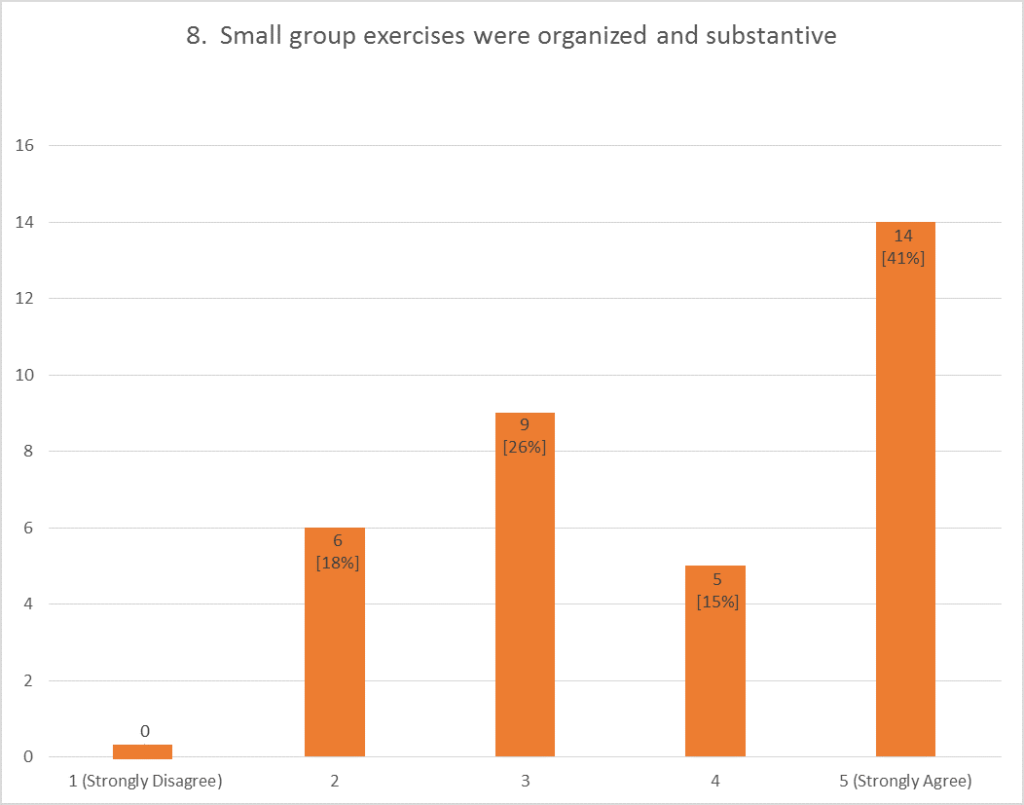
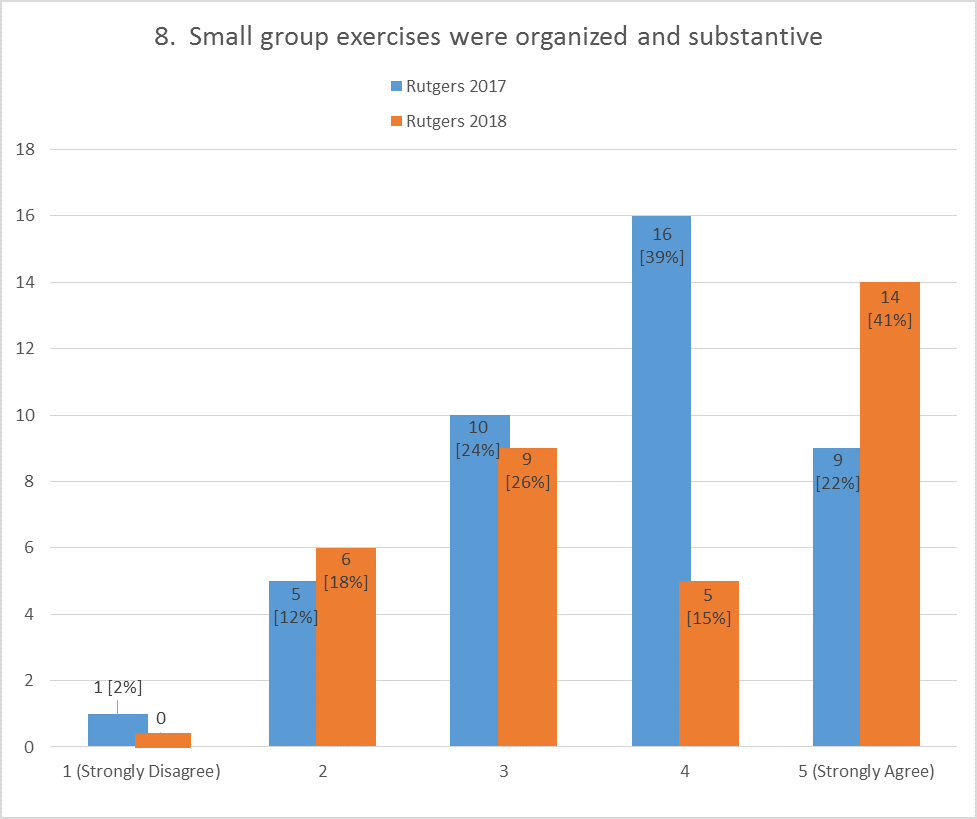
III. General Impression of the Course
11) The course met or exceeded my expectations
59% of respondents strongly agreed with the above statement and 41% agreed, showing that all respondents felt that the course met or exceeded their expectations.
None of the respondents indicated that the course didn’t meet their expectations.
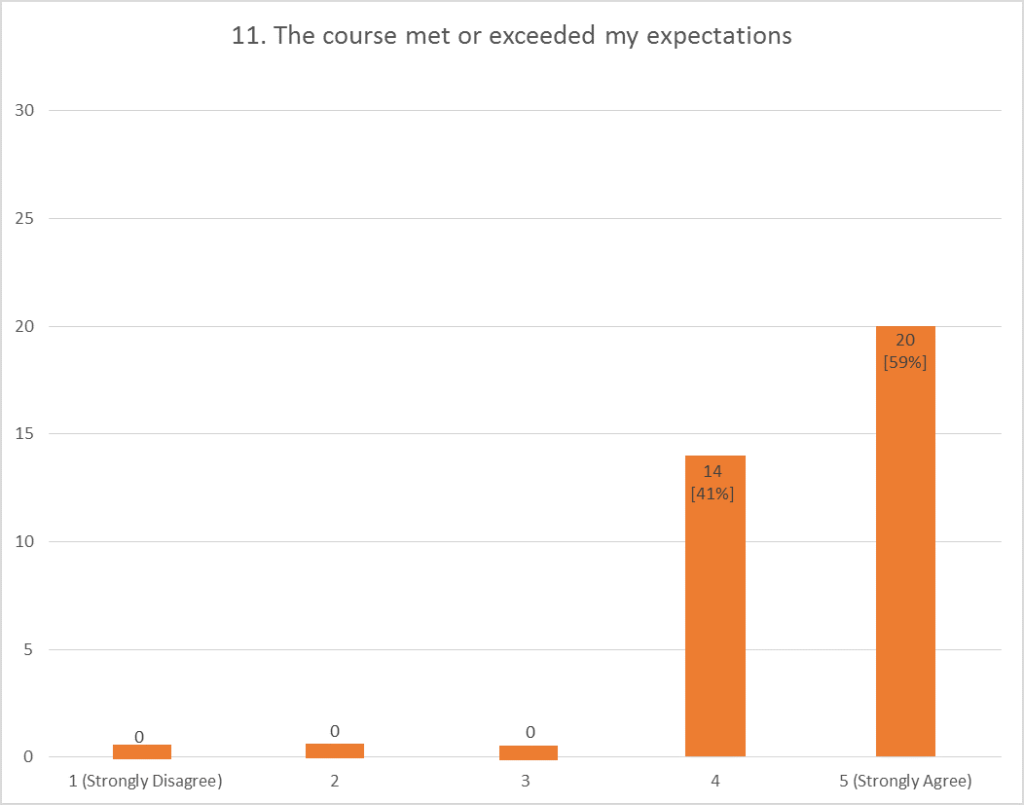
12) I would recommend this course to other people
88% of respondents strongly agreed with the above statement and 12% agreed, showing that all respondents felt that they would recommend the course to other people.
None of the respondents indicated that they wouldn’t recommend the course.
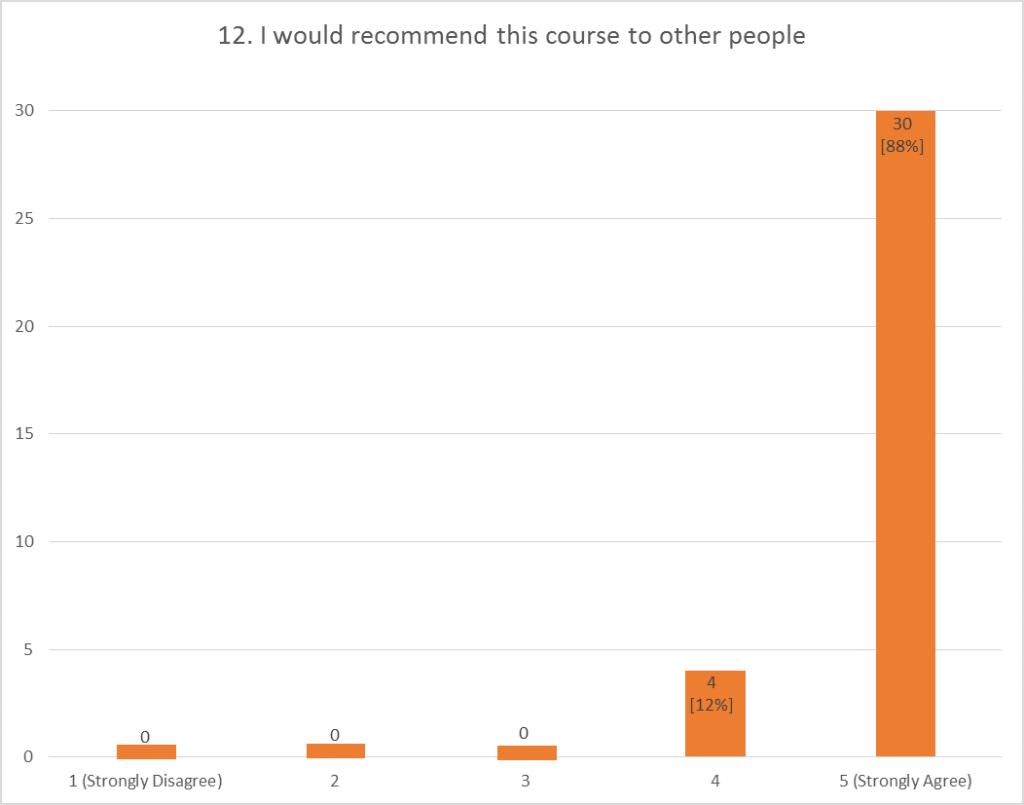
IV. Knowledge Gained
13) I now have more knowledge about civil resistance and its various topics than I had before taking the course
79% of respondents strongly agreed with the above statement and 21% agreed, showing that all of the survey respondents felt that they had more knowledge about civil resistance and its various topics than before taking the course.
None of the respondents indicated that they had less knowledge or the same amount of knowledge.
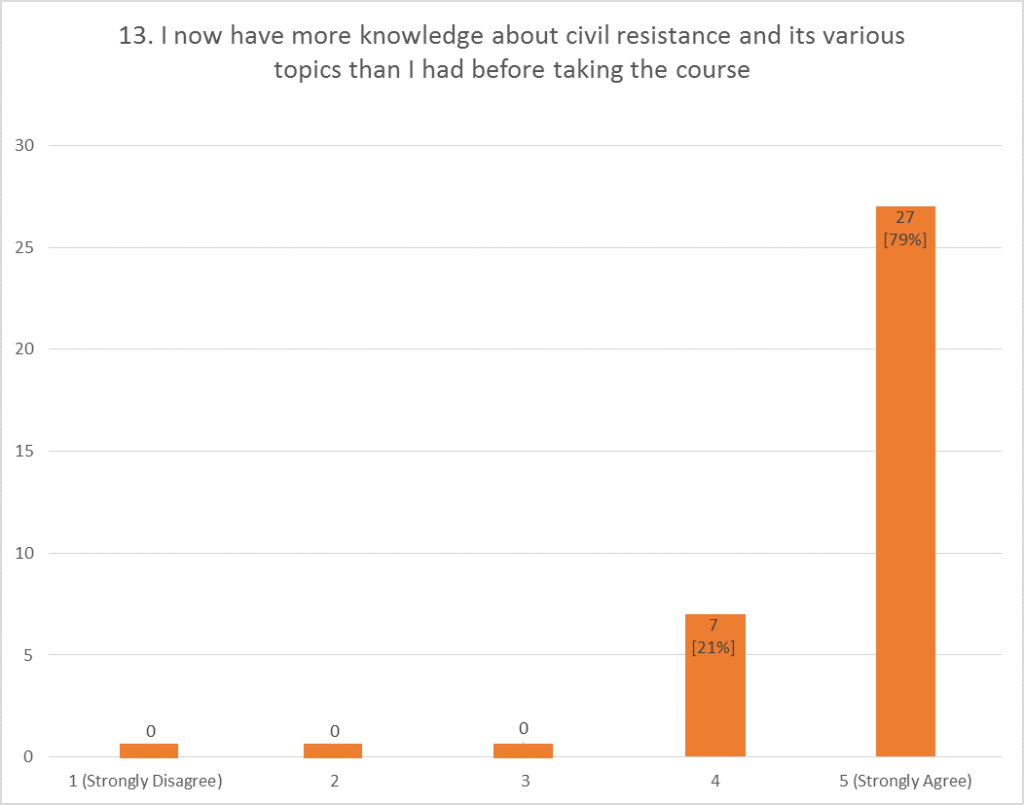
17) Course moderators offered useful comments
71% of participants strongly agreed with the above statement and 23% agreed, showing that almost all of the respondents found the course moderation to be useful.
Only 6% selected “3” and none of them selected “1” or “2”.
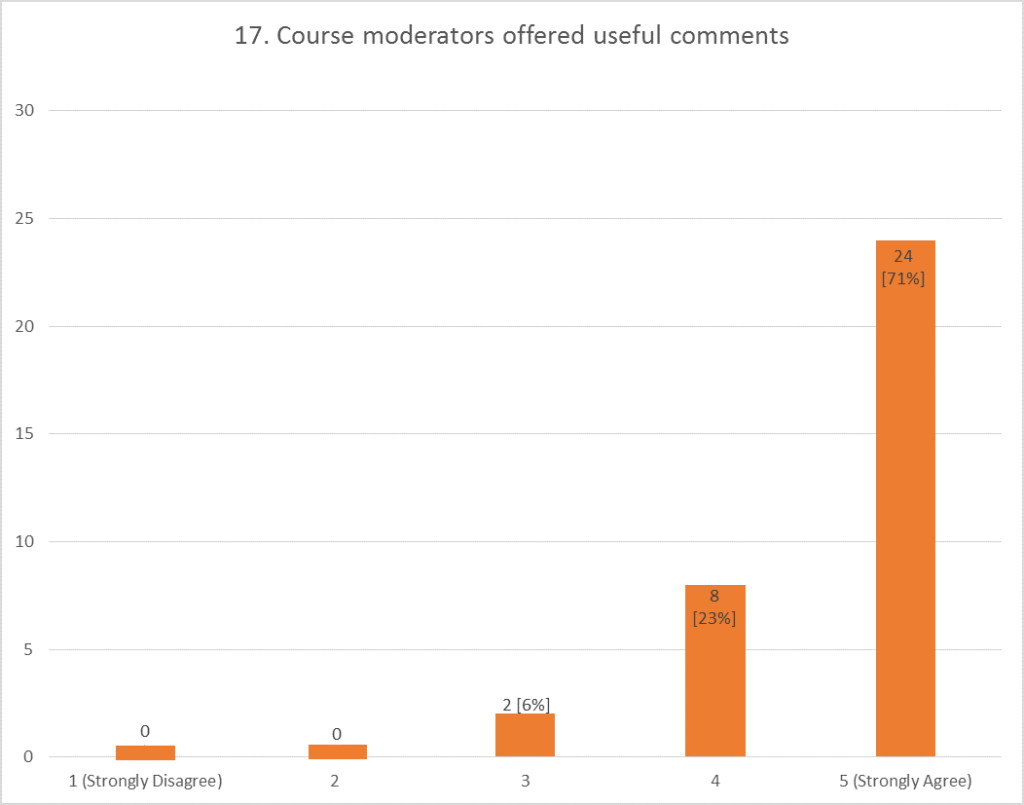
VI. Peer Learning
19) I learned about civil resistance from other course participants
60% of respondents strongly agreed with the above statement and 32% agreed, showing that most respondents felt like they learned from each other during the course.
6% of respondents selected “3”, 6% selected “2” and none of them selected “1”.
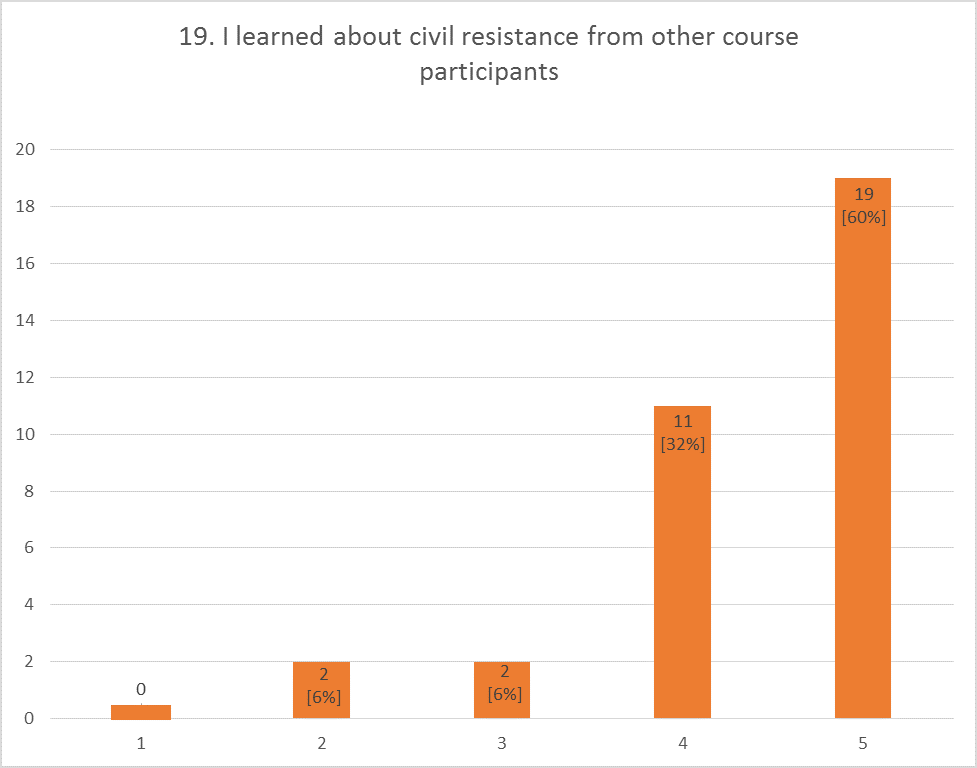
VII. Applicability
21) The knowledge I gained from the course will be relevant in my current and future study/work/activities
82% of respondents strongly agreed with the above statement and 15% agreed, showing that almost all of the respondents felt that the knowledge gained in the ICNC-Rutgers course would relevant to them professionally.
3% selected “3” and none of the respondents selected “1” or “2”
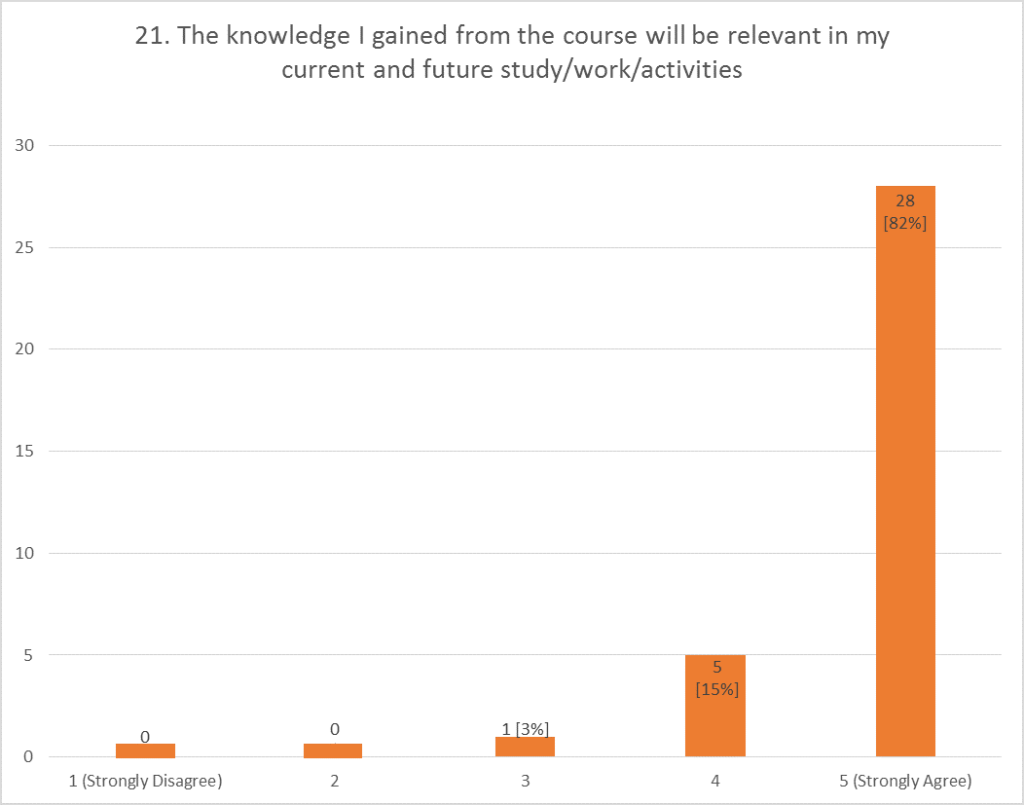
Follow-Up Survey Results
Three months after the ICNC-Rutgers 2018 course ended, the participants in the course were asked to complete a follow-up survey. 16 participants responded. Included below are the graphed responses to selected questions from the follow-up survey. To see the full results of the follow-up survey, please click here. You can use the links below to navigate directly to each selected graph.
1. If you joined a civil resistance campaign in the past three months, how influential was the online course in your decision to do so?
56% of respondents stated that the online course was very influential in their decision to join a civil resistance campaign after course.
2. Compared to before the online course, how actively involved are you currently in writing, researching, or teaching about civil resistance?
62% of respondents are more actively involved in writing, researching, or teaching about civil resistance than they were before the course.
3. Compared to before the online course, how involved have you been in leading or planning a civil resistance campaign over the last 3 months?
62% of respondents are more actively involved in leading or planning a civil resistance campaign than they were before the course.
5. Over the last 3 months, do you think that your skills in planning a civil resistance campaign have improved in comparison to your skills prior to taking the online course?
94% of respondents think that their civil resistance campaign planning skills have improved since taking the online course.
9. Over the past three months, how regularly did your campaign/movement consult educational materials on civil resistance?
56% of respondents reported that their campaign/movement frequently consulted educational materials on civil resistance.
11. Please provide us with a brief description of a civil resistance action within the last three months that your campaign/movement considered to be successful. In what ways, if any, did the knowledge gained from the online course impact the action’s success?
- “I have used the ICNC course content and materials very regularly in our local actions for justice and social change movement in considering alternative campaign tactics, defining objectives and designing media and communications strategies and materials. Specifically, we have organized a series of town hall events, used online platforms including website materials and hosting an informational webinar, and worked with local media, including a radio show/ podcast, to give voice to our platform. The resources from the ICNC course proved invaluable in giving me a firm grounding in various strategies and tactics that I have felt confident in sharing with our group.”
- “I used the knowledge from the course to help organize a hunger strike and it had a lot of acceptance and impact.“
- “Resistance against limitations on access to utilities. The knowledge from the course helped in mobilizing people and channeling our grievances to the authorities nonviolently.“
12. Please provide us with a brief description of an educational training/workshop within the last three months that your campaign/movement considered to be successful. In what ways, if any, did the knowledge gained from the online course impact the training/workshop’s success?
- “I’ve been very grateful to draw on the ICNC course resources in conducting a series of trainings on An Introduction to People Power, offered to 250 students across 3 campuses at Valencia College. I’ve also incorporated these materials into a training series for grassroots activists and organizers entitled “Organizing Action for Justice.” Really, both training series are completely based on the ICNC course materials, as well as drawn from Ivan Marovic’s recent book (with due credit given, of course!). We plan to continue these trainings indefinitely and are in discussions with local and statewide partners to expand this work.“
- “Next week we will facilitate a series of online meetings between Syrian and Sudanese NV activists.“
- “The course helped me to organize and deliver a workshop on nonviolence with the screening of Nashville’s civil rights struggle video, for its clear example of how to conduct a successful campaign.“
13. Since the completion of the course, in what ways have you used the knowledge from this course? (Participants could select more than one answer)
75% of respondents have used their knowledge from the course in planning nonviolent campaigns and training or teaching about civil resistance.
62% of respondents used their knowledge in the course in writing or reading about civil resistance.
Participants who selected “other” indicated that they used their knowledge to create local trainings. Their knowledge from their course was also useful for the design and implementation of projects that they started working on after the course.
14. Since the completion of the course, how interested are you in learning more about civil resistance?
94% of respondents are now more interested in civil resistance after taking the online course.
15b. Is the frequency of your engagement in the activities listed below higher, lower, or the same as compared to before the online course?
75% of respondents are more frequently engaged in alternative institution building than they were before the course.
62% of respondents are more frequently engaged in cultural resistance (music, art, humor, etc.) than they were before the course.
17. On the scale below, select the number that best represents your view about how important you think nonviolent discipline is in a successful nonviolent movement (1=Not at all, 5=Extremely important)
In the pre course survey, 62% of respondents believed that nonviolent discipline was extremely important in a successful nonviolent movement.
In the post course survey, that number had increased to 95% of respondents believing that nonviolent discipline was extremely important.
That percentage was nearly the exact same in the follow-up survey, as 94% of respondents selected that nonviolent discipline was extremely important.
Tips for Future Participants
- “I created a plan for how I was going to meet the requirements, which was critical for the first few weeks which had a much heavier reading load.”
- “I would normally spend time on Tuesday to do all the readings and videos. For me it was easier to review all the materials in a day. The following days I posted my opinions in the discussion forums and read the others posts.”
- “Religiously keep your time commitment to the course. As soon as a new module is released, download the material to your phone or tablet so that you can read/watch at your free time, anywhere – just in case something interferes with your schedule.”
- “I would recommend that participants get started as early as possible during the week. Don’t wait until the weekend to engage with the course materials and participate in the forum discussions. I would also recommend that even if participants can only do 30 min. per day that this is still a useful contribution so that they don’t get behind. The weeks that were most beneficial for me were ones when I scheduled one hour of course participation on my work calendar during lunchtime or early evening each day, so that I wouldn’t miss the chance to engage.”
- “Try to keep on top of the reading by starting early each week and spread the work out across the week instead of trying to cram it into one day or two. With the group work be proactive and reach out to your team members early and start communicating with them. Engage with other participants, I learnt a lot from other course members who had extensive knowledge on other civil resistance movements and provided really interesting resources.”
- “At the beginning of each module note down what is required and what is optional. Use the material as soon as it is online. Note on your list what you already read. Write down some takeaways and some questions that came up. Relate the topic to your knowledge and experience and background. Engage in the discussion forum. Getting in contact with other learners is often motivating and fun plus it helps to learn and apply. Spend some time each day to least stay up to date with the discussions.”
Selected Testimonials
- “I found the course extremely enriching for my academic research. Important concepts and ground ideas of civil resistance were very clear explained. The use of videos and readings was very helpful to understand the topics analyzed.“- María Belén Garrido
- “What a wonderful experience! The ICNC course was inspirational and well run. I highly recommend it to all interested in learning more about this fascinating topic. You gave me hope for the future even in these difficult times.“-David Hart, Co-Director Nonviolence International
- “I loved participating in this course, I learned a lot! The course materials were great and the course itself is structured in a way that you can learn and exchange so much with everyone else in it. The moderators are always making themselves present and there in case you need anything. Thank you ICNC for allowing me to partake in this, it was a privilege.“- Jadine Baldan
- “It is an excellent course…I am extremely thankful for the opportunity to take this course, and I recommend it to anyone who cares about a more just, peaceful and corruption-free world and wants to learn effective and powerful nonviolent tactics and strategies for achieving those.“- Dr. Sokfa John
- “This has been a wonderful learning experience. I learned more in this course than I ever expected to and my understanding of civil resistance has vastly improved. I also feel comfortable in using the knowledge I have gained to advance my own work in civil resistance.” Anonymous
- “I benefited immensely from this course because it taught me about civil resistance, a body of knowledge and practice that has shaped the history of the world we live in but is missing from our school history textbooks. The course moderators and the discussion forums were fantastic! They made the study material more relevant, interesting and meaningful”– Chintan Modi
- “The ICNC online course has been wonderful. I met different experts from diverse background with connected experiences of civil resistance and movement work that were both practical and theoretical. The course has broadened my perspective and expanded my horizon of nonviolent change beyond the ones read in the textbooks and classrooms.”-Muhammad Maigari Abdullahi
- “This was a rich, hugely insightful course that combined research findings, practical experience and tools for nonviolent resistance. The mix of materials and formats, and the interactive engagement of participants and facilitators alike, made it a motivating and insightful experience to be part of. Highly recommended to activists, peacebuilders, and change makers anywhere on the engagement spectrum!” -Jenny Aulin


